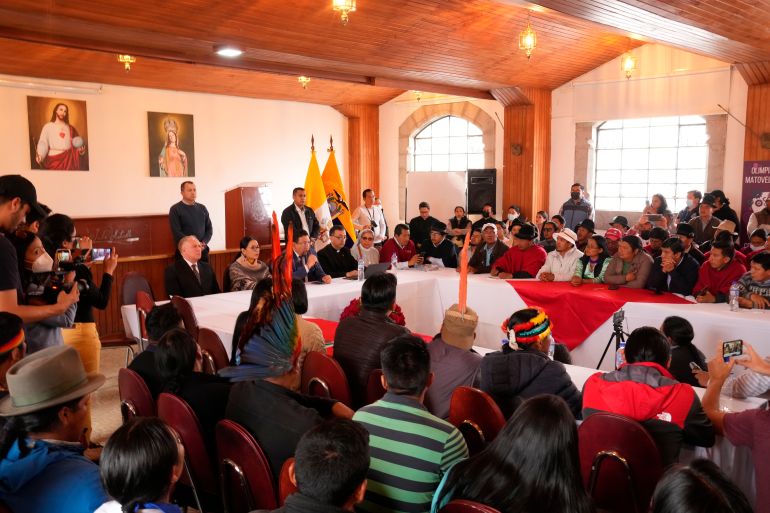Ecuador: Talks with protesters to resume amid state of emergency
Negotiations with Indigenous-led protesters were suspended on Tuesday after military said soldier killed in unrest.

Ecuador’s government says it will restart talks with Indigenous leaders spearheading protests against the soaring cost of living in the country, even as it issued a new state of emergency.
Government minister Francisco Jimenez did not give a time frame for when the talks, which were being mediated by the Catholic Church, will resume.
Keep reading
list of 3 itemsEcuador lifts emergency as talks begin with Indigenous protesters
Ecuador president announces fuel price cut amid days of protests
To “return peace to the Ecuadoran people, we have decided to accept the mediation now offered by the Episcopal Conference of Ecuador (CEE)”, Jimenez said on Wednesday.
The negotiations had begun on Monday, but were suspended the next day after the government blamed the death of a soldier on demonstrators. At least five protesters have died since the protests began on June 13.
Jimenez said the negotiations would proceed “so that we can arrive at a final solution in this conflict”.
On Wednesday, President Guillermo Lasso also declared a month-long state of emergency in four provinces – Azuay, Imbabura, Sucumbios and Orellana – where he said “most violence is concentrated”.
That came after Lasso had earlier in the week lifted a previous state of emergency in six provinces as part of an array of concessions aimed at stemming the unrest.
The latest state of emergency aims to create a “security zone” surrounding the country’s oil wells and to protect food, medicine and fuel supplies, according to the government. It does not include the capital, Quito, where most of an estimated 14,000 protesters have congregated in recent days.
Suspended talks
On Tuesday, the military said a soldier had died and five police and seven soldiers were injured in an attack by demonstrators on a tanker truck escort in the country’s east.
Lasso then struck out at Leonidas Iza, the leader of the powerful Confederation of Indigenous Nationalities of Ecuador (CONAIE), accusing him of being a self-serving politician and declaring “we will not negotiate with those who hold Ecuador hostage.”
Jimenez on Wednesday took a more measured tone.
“The goal of the national government is firstly to guarantee peace to Ecuadorans, and in pursuit of that standard, we will not abandon efforts that allow us to arrive at that long-awaited peace,” he said.
A series of concessions announced by Lasso in recent days have done little to allay the concerns of protesters, who have called for fuel price cuts, more jobs, controls on food prices and more public spending on health care and education.
A10-cents-per-gallon cut in diesel and gasoline prices announced on Saturday fell far short of protesters’ demands.
Meanwhile, the unrest has been costly for Ecuador, with losses of some $50m per day to the economy, according to the government, which has warned oil production – already halved – could come to a complete halt soon.
Indigenous people make up more than a million of Ecuador’s population of 17.7 million, with CONAIE proving a particularly influential force in the country’s politics. The alliance is credited with unseating three presidents between 1997 and 2005.